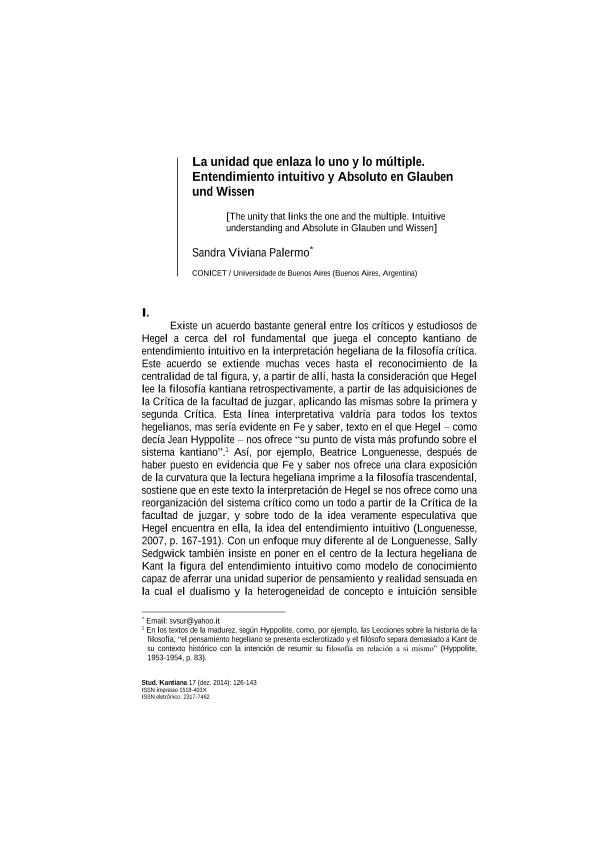Mostrar el registro sencillo del ítem
dc.contributor.author
Palermo, Sandra Viviana

dc.date.available
2018-07-05T13:47:31Z
dc.date.issued
2014-12
dc.identifier.citation
Palermo, Sandra Viviana; La unidad que enlaza lo uno y lo múltiple: Entendimiento intuitivo y Absoluto en Glauben und Wissen; Sociedade Kant Brasileira; Studia Kantiana; 12; 17; 12-2014; 126-143
dc.identifier.issn
1518-403X
dc.identifier.uri
http://hdl.handle.net/11336/51291
dc.description.abstract
El paper analiza la lectura hegeliana del concepto de entendimiento intuitivo en Fe y saber. Como intentaremos mostrar, tal concepto constituye un modelo cognoscitivo privilegiado para Hegel en virtud de su carácter de “universal sintético”, es decir, en virtud del hecho de que aquí el todo se constituye como lo que contiene el fundamento de la posibilidad de las formas de las partes y de la conexión de las mismas entre ellas y con la totalidad. El universal que Kant atribuye al entendimiento intuitivo en el § 77 de la KU se presenta, para Hegel, como totalidad que contiene la ratio de la identidad de las partes (lo que ellas tienen en común y que las vuelve partes de un único todo), y, al mismo tiempo, la ratio de su diversidad (aquello en virtud de lo cual la totalidad no se presenta como una unidad indiferenciada, analítica).
dc.description.abstract
The article analyzes the Hegelian reading of the concept of intuitive understanding in Faith and knowledge. As we intend to show, such a concept constitutes a privileged cognitive model for Hegel by virtue of his nature of “synthetic universal”, i.e., by virtue of the fact that here the whole becomes something that contains the grounds of the possibility of its form and of the connection between the parts and between the parts and the whole. The universal that Kant attributed to the intuitive understanding of the KU § 77 presents itself, for Hegel, as a whole that should contain the ratio of the identity of the parts (what they have in common, and that make them part of a single whole), and, at the same time, the ratio of the diversity (that by virtue of which the whole is not an undifferentiated or analytical unity).
dc.format
application/pdf
dc.language.iso
spa
dc.publisher
Sociedade Kant Brasileira
dc.rights
info:eu-repo/semantics/openAccess
dc.rights.uri
https://creativecommons.org/licenses/by-nc-sa/2.5/ar/
dc.subject
Entendimiento Intuitivo
dc.subject
Universal Analítico
dc.subject
Universal Sintético
dc.subject
Absoluto
dc.subject.classification
Estudios Religiosos

dc.subject.classification
Filosofía, Ética y Religión

dc.subject.classification
HUMANIDADES

dc.title
La unidad que enlaza lo uno y lo múltiple: Entendimiento intuitivo y Absoluto en Glauben und Wissen
dc.type
info:eu-repo/semantics/article
dc.type
info:ar-repo/semantics/artículo
dc.type
info:eu-repo/semantics/publishedVersion
dc.date.updated
2018-07-03T13:34:53Z
dc.journal.volume
12
dc.journal.number
17
dc.journal.pagination
126-143
dc.journal.pais
Brasil

dc.description.fil
Fil: Palermo, Sandra Viviana. Consejo Nacional de Investigaciones Científicas y Técnicas; Argentina. Universidad de Buenos Aires; Argentina
dc.journal.title
Studia Kantiana

dc.relation.alternativeid
info:eu-repo/semantics/altIdentifier/url/http://www.sociedadekant.org/studiakantiana/index.php/sk/article/view/183
Archivos asociados
